12. 07. 2014
Cavtat, July 12, 2014 – The region’s political leaders, namely Mr. Ivo Josipović, Mr. Bujar Nishani, Mr. Bakir Izetbegović, Mr. Željko Komšić, Mr. Nebojša Radmanović, Mr. Filip Vujanović, Ms. Atifete Jahjaga, Mr. Gjorge Ivanov, Mr. Borut Pahor and Mr. Tomislav Nikolić, will meet with the most prominent decision makers in the region’s business world at the upcoming Summit100, which will take place on July 14 and 15 in Cavtat, Croatia. At an informal, Gymnich-style meeting, in direct contact with the businessmen, the region’s heads of state will hear about the obstacles to doing business across the region and find out which business ideas and projects have the potential for economic growth.
The markets of the countries in the region are rather small but their potential, particularly through cooperation with the neighboring countries, is considerable. This particular topic, as well as concrete cooperation between companies, will be discussed at seven theme-based roundtable discussions featuring CEOs across the region.
“The differences between the countries are minor; they have the same problems relating to infrastructure, rule of law and institutions’ efficiency, and in some countries there is political instability as well. These are issues burdening the countries in the region,” said the President of the Management Board of NLB Bank Janko Medja. “Energy is the current buzz word in Bosnia and Montenegro, and it is the same with tourism in Montenegro. On the other hand, the size of the Serbian market comes with certain specific characteristics; however, in order for them to attract investors, the country needs to work on the rule of law. Foreign investors, banks included, cannot have an inferior position when realizing their rights and claiming compensation before the court,” believes Medja.
“Serbia has strong political and economic ties to Russia and should therefore be a bridge for economic relations. The same can be said of the cultural and political relations between Bosnia and Herzegovina and Turkey,” said AT Kearney’s senior director for SEE Ivo Šimek. “Macedonia and Kosovo are intertwined nationally and depend on the neighbors’ political influence, while Croatia and Slovenia as EU member states have come across certain impediments in their trade with the non-EU states. In order to create a more favorable entrepreneurial climate in the region, the process of integration should be sped up, and that means the process of democratization as well. Marketing-wise, the region and the individual countries in it have not yet created a positive image in Europe. The politics has failed to create a possibility of attracting major green field investments, the corruption is rather high, the legal framework very unreliable and old-fashioned, and the public administration generally very poor,” warns Šimek.
About Summit100:
Business leaders’ Summit100 is a unique business gathering, the first of its kind in the region. It has been envisaged as a powerful force of economic networking, as well as a contribution to the political leaders’ efforts to improve relations and lives across the region. The goal of Summit100 is to become a permanent platform and a meeting place for the most prominent entrepreneurs and economists from Bosnia and Herzegovina, Croatia, Kosovo, Macedonia, Montenegro, Slovenia and Serbia, as well as for the region’s highest state officials, so that together they would open up prospects for the strengthening of the countries’ economies and the competitive potential of the entire SEE. The organizers of the Summit100 are the Croatian Employers’ Association (HUP), Serbian Association of Managers (SAM), Atlas Foundation and Managers’ Association of Slovenia (ZMS).
